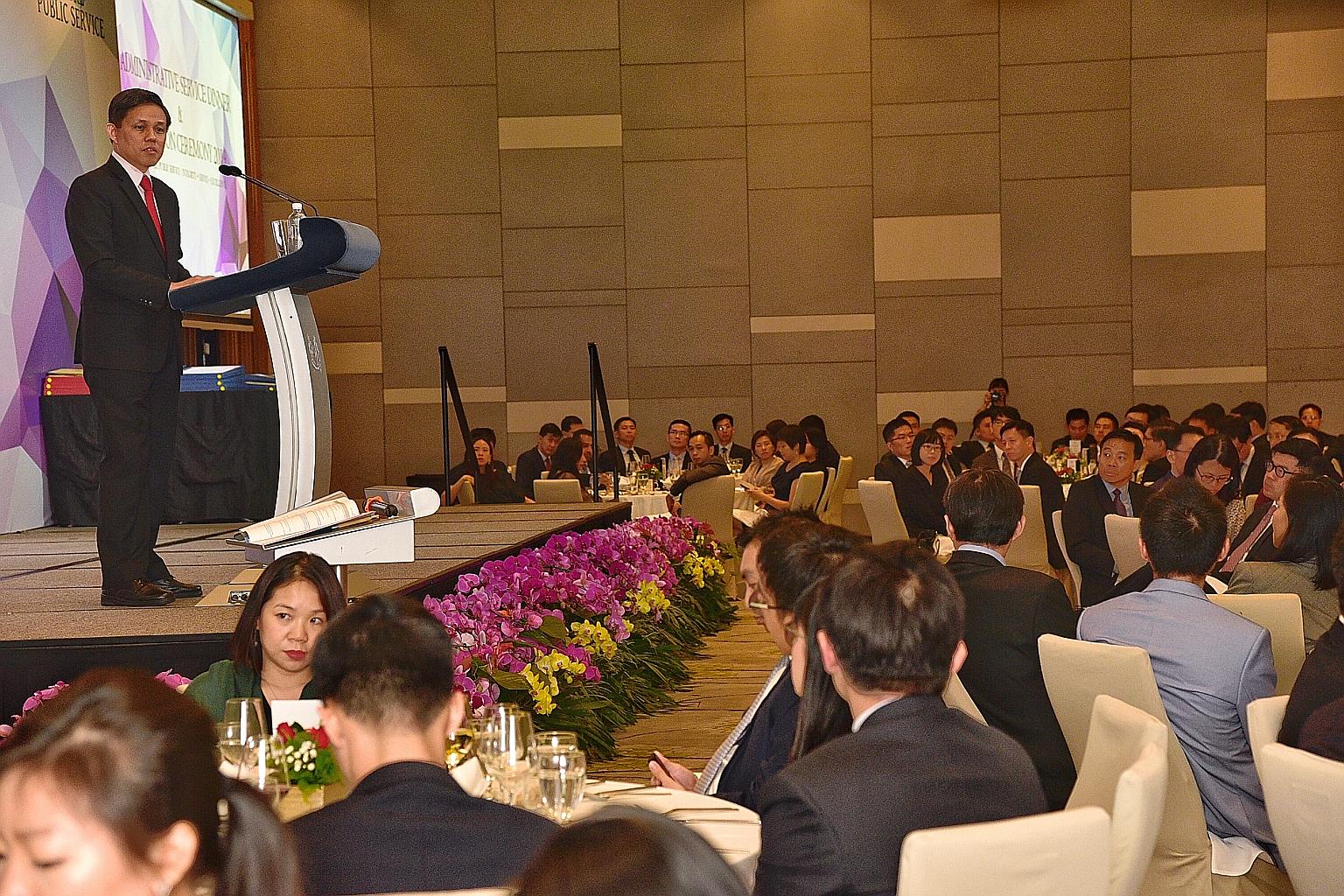Chan Chun Sing spells out three benchmarks for rating civil service
It must anticipate tomorrow's problems, improve today's services and have integrity
Sign up now: Get ST's newsletters delivered to your inbox

Trade and Industry Minister Chan Chun Sing giving his keynote speech at the Administrative Service Dinner and Promotion Ceremony yesterday. The public service must avoid becoming complacent and stagnant as it becomes more successful and structured, he said.
ST PHOTO: DESMOND WEE
The public service's ability to pre-empt tomorrow's challenges, to continuously improve today's services, and its values of service, integrity and excellence are the hallmarks on which it will be judged, Trade and Industry Minister Chan Chun Sing said last night.
While noting that the public service has served Singaporeans well all these years, he said it is far from perfect. It must avoid becoming complacent and stagnant as it becomes more successful and structured, he added.
Speaking at the annual Administrative Service Dinner and Promotion Ceremony, he also spelt out what integrity means in the public service. One is recognising strengths and weaknesses and acknowledging the need to do better, and the other is taking responsibility for actions that have been taken.
The minister said a forward-looking public service must spend at least 20 per cent of its energies pre-empting tomorrow's challenges, besides fixing today's problems. Individuals need to learn new things and build new capabilities.
Another 20 per cent of the time should be devoted to improving the way tasks are done today, leaving 60 per cent for conscientiously executing these tasks well, he added in his 25-minute speech.
Mr Chan, who is also Minister-in-charge of the Public Service, said that for the service to check its own blind spots, its officers must never believe they have all the best ideas and all the necessary skills or that they can carry out the tasks alone.
To this end, he said, the public service must build diverse teams for resilience. "A good public service needs teams who can do policy well, have operational experience on the ground, can communicate well and also have international exposure and perspectives.
"And this is why I ask the public service to review the way we select and develop our leaders," he told the gathering of 300 at the ParkRoyal hotel in Beach Road.
During the ceremony, 13 officers were appointed to the Adminis-trative Service, and another 59 were promoted.
The minister said he was glad head of civil service Leo Yip and the Public Service Commission are reviewing the way officers are selected and groomed. He noted that there is a "very refined system" of selection and progression now, and that the more refined it is, the greater the danger that all the officers are measured with the same yardstick.
"But if we are all of the same, it can make us brittle and fragile as a system. We need to build our resilience through diversity of strengths and bond the individuals into a cohesive and coherent team," he said.
He added that efforts will be stepped up to send officers to private companies, non-public agencies and on overseas postings to learn, observe and bring back insights to strengthen the service.
Turning to recent events which have led some commentators to raise questions about whether the public service could know its own blind spots or to take responsibility for mistakes, he said these questions go to the "heart" of what the public service stands for.
While he did not mention the events he had in mind, there have been several lapses in the public sector in recent months. These include the SingHealth data breach in which hackers stole the personal data of 1.5 million patients, the leak of HIV patient data, and the personal information of blood donors being improperly put online by an IT vendor.
On responsibility, Mr Chan said: "When things go wrong, we are all accountable for our responsibilities and for the men and women under our charge. When things go wrong, we never blame the whole world and ask who we should punish collectively or indiscriminately."
As a political office-holder, it is his job to "stand in the gap" and his duty to take the public pressure, he said. This is so that the public service can do its job without undue public or short-term pressure, and will be confident to try new ideas.
But it is also the responsibility of the public service to not second-guess and to always give the strongest options for political office-holders to make the collective call.
Mr Yip, in his speech on the spirit of public service, also touched on the responsibility which leaders in the public service need to shoulder.
"The people, systems, processes and outcomes in an organisation are a leader's responsibility," he said. "If lapses happen as a direct result of our leadership slackness, negligence or incompetence, we will rightfully have to be personally accountable as the leader."


